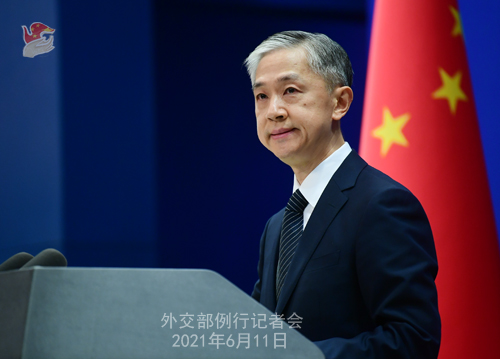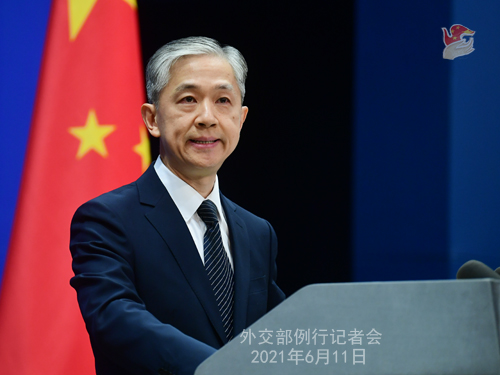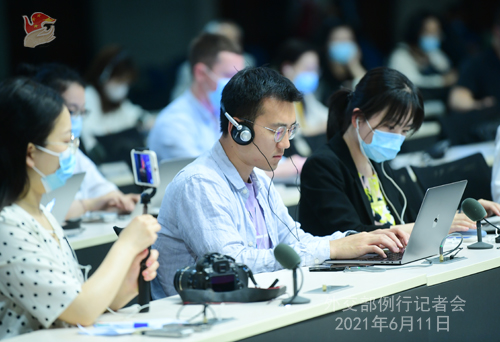| Foreign Ministry Spokesperson Wang Wenbin's Regular Press Conference on June 11, 2021 |
| 2021-06-11 19:36 |
|
State Councilor and Foreign Minister Wang Yi will deliver an address titled "Uphold Multilateralism to Promote Common Security" at the Geneva-based Conference on Disarmament (CD) on June 11. Xinhua News Agency: Yonhap reported on June 7 that Ambassador of the ROK to ASEAN Lim Sungnam expressed concern over the Japanese government's decision to discharge nuclear contaminated water from Fukushima nuclear power plant into the sea while attending a virtual EAS Ambassadors' Meeting. Lim pointed out that Japan's ocean discharge plan is problematic in terms of transparency, consultation and verification and stressed that it might negatively impact human health and marine environment. The ROK is deeply concerned about it. Does China have any comment? Wang Wenbin: I've taken note of relevant reports and fully understand the ROK's position. Besides the ROK, many Pacific-rim countries including China all oppose Japan's decision to release nuclear contaminated water into the sea. The Japanese government, in disregard of doubts and objection at home and abroad, made the highly irresponsible unilateral decision to dispose of nuclear contaminated water from Fukushima by ocean discharge before exhausting safe disposal means, disclosing all relevant information, fully consulting with neighboring countries and other stakeholders or coming up with verification arrangement that can be monitored. The international community's major concerns are as follows: First, Japan has neither fully consulted with neighboring countries and other stakeholders nor addressed seriously the legitimate concerns of all relevant parties. Second, Japan made the decision based solely on economic calculation without considering the impact on marine ecology, food safety and public health. Third, the Tokyo Electric Power Company (TEPCO) has a poor track record of data-tampering and cover-up in its handling of the Fukushima nuclear accident and so the data it releases is not trustworthy. Recently Japanese media have reported on distressing incidents involving radioactive leaks on the site of the Fukushima Daiichi Nuclear Power Station. Fourth, the Japanese side claims that the treated unclear contaminated water is safe, but has no verifiable arrangement in place. Many Chinese people are wondering, if the water is truly harmless, why doesn't the Japanese side discharge it into lakes or use it for civil purposes instead of releasing it into the ocean? Japan needs to give a direct response to these questions and concerns. The disposal of the nuclear contaminated water requires the greatest prudence and we cannot afford a misstep. Japan cannot knowingly deceive itself and simply dump the water and do done with it. Once again we urge the Japanese side to assess the issue anew and revoke its wrong decision. It must not wantonly start the ocean discharge before consulting and reaching consensus with all stakeholders including neighboring countries and relevant international institutions. China Daily: The rapid rise of China's red tourism has caught the attention of international media. Many say that as the CPC celebrates its centenary, the flourishing red tourism has inspired the Chinese people's patriotism and support for the Party, enhanced solidarity, boosted domestic consumption and helped former revolutionary bases to shake off poverty, achieving both economic and social benefits. Do you have any comment on that? Wang Wenbin: Red is the defining color of the CPC and China. The century-old history of the CPC is chronicled by many "red sites", and every piece of the red land records the Party members' selfless and arduous struggle and exploration for national rejuvenation and people's happiness. History is the best textbook. Visits to the revolutionary sites help us understand how the CPC has grown strong from a small party, so that we will never forget where we came from and draw wisdom and strength from the history to forge ahead. Also, red tourism is a successful practice of the CPC leading the Chinese people to a new life. Red tourism is closely integrated with the government's policies and projects including sustainable development, poverty alleviation, rural revitalization, agricultural diversification, producing a rich variety of cultural products with unique characteristics. It has empowered the revitalization of former revolutionary bases and supported poverty reduction in impoverished areas. In 2019, the country saw a total of 1.4 billion red tourism trips and the revenue exceeded 400 billion yuan. In 2020, red tourism strongly boosted the post-COVID recovery of China's tourism market. All these show that China's red tourism boom is mainly the result of the Chinese people's spontaneous pilgrimage to the holy sites of revolution, which reflects the Chinese people's endorsement of the CPC and their pride in China's development. Finally, I want to stress that these red revolutionary sites in China also serve as a window through which foreign friends can learn more about China and the CPC. Through visits to those sites, you will be impressed by the young Chinese Communists' lofty ideal to make a difference and defend the motherland; you can get to know how the Chinese revolution has marched from victory to victory; you can grasp the CPC's maxim of serving the people heart and soul as public servants, thus understanding why the CPC can win the endorsement and support of the people. We sincerely welcome people from all sectors to visit the holy sites of revolution in China to understand the real CPC and China. Phoenix TV: The British government released the Six-monthly Report on Hong Kong, declaring that China is in a state of ongoing non-compliance with the Sino-British Joint Declaration. UK's Secretary of State for Foreign, Commonwealth and Development Affairs stated that Britain and the international community "must continue to stand up for the rights and freedoms of the people of Hong Kong" and "continue to hold China to its obligations". Do you have any comment? Wang Wenbin: The British government released its latest so-called Six-monthly Report on Hong Kong yesterday. The report, which is full of ideological bias, is a continuation of its moves to confound right with wrong and distort facts. The groundless accusations against China's policies in Hong Kong made by Foreign Secretary Dominic Raab in the foreword of the report again constitute gross interference in Hong Kong affairs and China's domestic affairs. We strongly condemn and firmly oppose this. I must stress that Hong Kong is part of China and One Country, Two Systems is China's basic national policy. The Central Government cares about Hong Kong and hopes to see the continued successful implementation of One Country, Two Systems more than anyone. Since Hong Kong's return, the Central Government has been governing Hong Kong in accordance with the China's Constitution and the Basic Law of the Hong Kong SAR. The policy of One Country, Two Systems, "Hong Kong people administering Hong Kong" and a high degree of autonomy has been earnestly implemented. Hong Kong residents' lawful rights and freedoms have been fully guaranteed according to law. These are undeniable facts. Everything we've done, whether it's the promulgation of the Law on Safeguarding National Security in the Hong Kong SAR or improving Hong Kong's electoral system, is aimed to uphold and improve the One Country, Two Systems institution, ensure its steady and sustained implementation, and realize lasting peace, stability and prosperity in Hong Kong. Since the Law on Safeguarding National Security in the Hong Kong SAR took effect nearly a year ago, Hong Kong has regained stability and returned to the right track. Global capital keeps flowing into Hong Kong and foreign enterprises are more confident about Hong Kong's business environment. The improved electoral system fully implements the principle of "patriots governing Hong Kong", ensures extensive and balanced political participation of Hong Kong residents and better accommodates the interests of all social strata, all sectors and all aspects. The democratic political system in Hong Kong will advance in a sound and steady manner and good governance will be gradually realized. The IMF in its latest report once again recognized Hong Kong's status as a global financial hub, casting a vote of confidence in its growth prospects. We believe that with the full support of the Central Government and the concerted efforts of people from all walks of life in the SAR, Hong Kong will surely maintain lasting stability and prosperity and its status as a global financial, shipping and trade hub will be cemented. The so-called British report disregards these facts and spared no effort to attack and smear China's Central Government and Hong Kong SAR. The report also listed with great pride a series of despicable actions taken by the UK to meddle in Hong Kong affairs and undermine its stability and prosperity. Under the disguise of upholding Hong Kong's democracy, the UK has been meddling in Hong Kong's politics and interfering in China's domestic affairs. Under the disguise of standing up for Hong Kong people's rights, the UK has been disrupting Hong Kong and reaping benefits at others' expense. Hong Kong affairs, which are purely China's domestic affairs, bear on China's sovereignty, security and core interests and brook no external interference. We urge the UK to abide by international law and basic norms governing international relations, grasp the reality that it has been 24 years since Hong Kong's return to the motherland, let go of its old colonial dream, get rid of double standard, stop releasing relevant reports, stop meddling in China's domestic affairs including Hong Kong affairs in any way, and do more things in the interest of Hong Kong's stability and prosperity and China-UK relations.
Reuters: The Anti-Foreign Sanctions Law was passed this week, and the foreign business community has expressed concern about how it could further politicize the business environment. Are you worried about the negative impact that this law may have on foreign investment? Wang Wenbin: The Legislative Affairs Commission of the NPC Standing Committee has already offered information on this. Around this year's "two sessions," some NPC deputies, CPPCC members and people from all walks of life suggested that it is necessary for China to formulate a specific law on countering foreign sanctions to provide legal support and guarantee for the country to counter discriminatory measures by a foreign country in accordance with the law. According to related work plan, the Legislative Affairs Commission of the NPC Standing Committee has formulated the draft law after studying the legislation advice from various sectors, summarizing China's anti-sanction practices as well as related work, taking into account related overseas legislation, and soliciting opinions from the CPC Central Committee and national government departments as well as experts. In accordance with the legal procedure, the NPC Standing Committee conducted two reviews of the draft in April and June respectively. The Legislative Affairs Commission solicited opinions on the draft law from the CPC Central Committee and national government departments. The Constitution and Law Committee of the NPC then revised and improved the draft in accordance with the deliberations of the Standing Committee and the opinions from various sectors. The law on countering foreign sanctions that has been adopted accommodates input from various sectors, reflects the will of the Chinese people and is consistent with international law and basic norms of international relations. As to the impact of the law on foreign investment, I don't see any causal effect here. If anything, the legislation will help create a predictable legal environment and stable and foreseeable business environment for foreign companies' development in China. The 29th session of the 13th NPC Standing Committee also reviewed and adopted the Hainan Free Trade Port Law and a draft decision to authorize the Shanghai Municipal People's Congress and its standing committee to formulate regulations concerning the Pudong New Area. These are new measures China has taken to deepen reform and opening-up. I want to stress that China always welcomes and supports foreign companies doing business and pursuing cooperation in China and protects their rights and interests in accordance with law. China will only open its door wider to the world and remain committed to fostering better business environment for foreign companies and sharing development opportunities with the rest of the world. AFP: Amnesty International released a report yesterday claiming that China's "oppressive" actions against Uyghurs and other ethnic minorities constitute "crimes against humanity". What's your response to this? Wang Wenbin: People are clear about the nature of Amnesty International. This organization, wearing tinted glasses, has been misleading the public and spreading lies and rumors about Xinjiang. Its so-called report is like adding one more page to its "record of lies". We urge the relevant organization to abandon its persistent prejudice against China, stop fabricating and spreading disinformation and look at relevant issues from an objective and just perspective. Bloomberg: Yesterday, the US Trade Representative and her Taiwanese counterpart had a meeting in which they agreed to resume the discussions on the trade and investment framework agreement between the two parties. Do you have any comment on this and on those contacts? And also, do you have any comment to make about Taiwan's expressed interest in joining the CPTPP? Wang Wenbin: On your first question, China's position on the Taiwan question is consistent and clear. We firmly oppose all forms of official interactions between the US and Taiwan and reject any agreement with implications of sovereignty and of official nature between countries having diplomatic ties with China and the Taiwan region. China urges the US side to earnestly abide by the one-China principle and the three China-US joint communiqués, discontinue all forms of official interactions with the Taiwan region, avoid sending any wrong signal to "Taiwan independence" forces to avoid undermining China-US relations and peace and stability across the Taiwan Strait. On your second question, as we have repeatedly said, the Taiwan region's participation in regional economic cooperation must be handled on the basis of the one-China principle. Bloomberg: Yesterday, a US naval vessel and an Australian naval vessel sailed together through the South China Sea. Do you have any comment on the action? Wang Wenbin: We hope relevant countries can do more to promote regional peace and stability, rather than flex muscles. ********* According to this year's public holiday schedule for the Duanwu or Dragon Boat Festival, the MFA regular press conference will be adjourned on Monday, June 14 and resumed on Tuesday, June 15. In the meantime, you may send your questions to the MFA Spokesperson's Office via fax, email or WeChat as usual. I'd like to wish all of you safety and good health on this traditional Chinese festival!
|
| |||||||||||||||
|
|||||||||||||||




